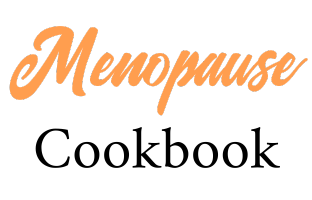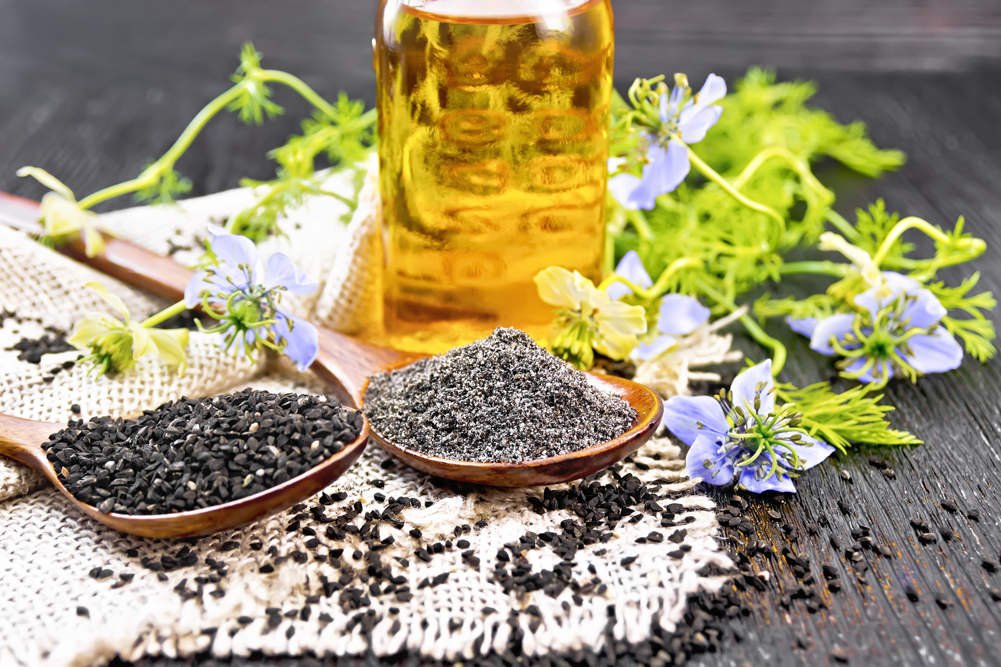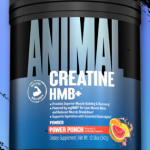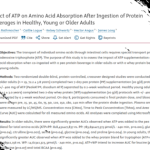In June and December of 2023, I wrote two articles for Vitamin Retailer on black seed oil, “Evidence Based Uses of Standardized Black Seed Oil” and “Synergism Among Nutraceuticals: Black Seed Oil, Omega-3, Astaxanthin & More,” respectively. In those articles, I discussed research on black seed oil (BSO), including a study demonstrating that a specific standardized BSO (ThyomoQuin) effectively lowered cortisol levels. In this article, I’m going to expand on the cortisol-lowering effects of BSO.
BSO Background
First, let’s look at some background on this botanical. Black cumin seed, or black seed for short (Nigella sativa) has been used medicinally for over 2,000 years.1,2 Greek pharmaco-botanist, Dioscorides (40-90 CE) described the use of black seeds from a plant, now thought to be N. sativa, as a remedy for breathing difficulties, inflammatory conditions, skin ailments and parasites.3
A naturally occurring compound known as thymoquinone gives BSO many of its properties. In modern research, the properties of BSO standardized for thymoquinone (3 percent) and low acidity include, but are not limited to, reducing systolic blood and diastolic blood pressure,4 reducing upper respiratory tract complaints, better overall well-being, superior microbiome diversity and lowering cortisol levels5—the significance of which is discussed below.
About Cortisol
Cortisol is the body’s primary stress hormone, produced by the adrenal glands in response to perceived stress. It plays a crucial role in the body’s “fight-or-flight” response. If, for example, you’re walking in the wild and come across a lion, you may need to run for your life. What do you need the fight-or-flight response to do to help you survive? Essentially, you need it to mobilize energy and prepare your body for action. To this end, cortisol increases your blood glucose levels (for energy), enhances your brain’s use of glucose (for alertness), and increases your heart rate and blood pressure since you’ll need lots of blood pumping through your limbs. Cortisol will also promote the breakdown of muscle tissue and fat for energy. At the same time, cortisol will also slow functions that would be nonessential or harmful in a fight-or-flight situation. It reduces immune system responses and suppresses the digestive system, the reproductive system and growth processes. This complex natural alarm system also communicates with the brain regions that control mood, motivation and fear.6,7 While these are important functions in short-term fight-or-flight situations, chronic cortisol secretion is a different story.
Implications of Chronic Cortisol Secretion
While it’s true that you may not find yourself needing to run from lions very often, other types of stressful situations can also promote the release of cortisol. This may include arguing with your spouse or kids, dealing with a difficult situation or boss at work, being stuck in a traffic jam and other frequent stressful events in life. The fact is, that—according to a Gallup poll—49 percent of Americans report frequent stress, which is up 16 points over the last two decades.8 Unfortunately, when it comes to cortisol secretion, the body doesn’t always discern between a real fight-or-flight situation, or an ongoing and frequent stress. As a result, a chronically stressful life can result in chronic cortisol secretion.
Now consider that elevated cortisol contributes to inflammation and glycation (the binding of sugars to proteins which can have many negative effects).9 Chronic elevation of cortisol due to prolonged stress can exacerbate inflammation and glycation, which in turn can contribute to the progression of chronic diseases. For example, chronic elevation of cortisol and the role it plays in glycation can impact weight gain, insulin resistance, cholesterol levels, blood pressure, muscle weakness, bone loss, joint pain, mood disturbances, diabetic complications and the formation of wrinkles due to glycation-induced cross-linking of collagen.10-14
Cortisol, oxidation, inflammation and glycation are interconnected biological processes that contribute to cellular and tissue damage, as well as to ongoing activation of stress-mediated pathways. These mechanisms often amplify each other in a vicious cycle, driving the progression of chronic diseases such as diabetes, cardiovascular disorders and neurodegenerative conditions. Consequently, the reduction of cortisol in chronic situations is desirable. This is where specific BSO compositions like ThymoQuin can help.
BSO and Cortisol
Emerging evidence suggests that BSO may influence the hypothalamus-pituitary-adrenal (HPA) axis, a central regulator of cortisol secretion. Animal studies indicate that BSO reduces HPA axis hyperactivity, lowering cortisol levels in stress-induced models.15 Human studies also showed positive results, with the first study16 published as early as 1965 demonstrating that black seed significantly helped control allergic disorders, in part through reducing cortisol levels in plasma. More recent human research has likewise demonstrated the cortisol-reducing effects of BSO.5,17
BSO Studies for Modulating Cortisol, Stress, Sleep and Immunity
To investigate the influence of BSO in modulating stress, sleep, and immunity, a 90-day randomized double-blinded placebo-controlled study17 was conducted with healthy volunteers (n = 72) who had self-reported non-refreshing sleep issues. Subjects were given 200 mg/day BSO or placebo. Assessment included Pittsburgh Sleep Quality Index (PSQI), and Perceived Stress Scale (PSS) validated questionnaires for monitoring sleep and stress respectively, along with the measurements of cortisol and melatonin levels. Immunity markers were analyzed at the end of the study. Results were that in the BSO group, 70 percent of the participants reported satisfaction with their sleep pattern on day seven and 79 percent on day 14. Additionally, both inter- and intra- group analyses of the total PSQI scores and component scores (sleep latency, duration, efficiency, quality and daytime dysfunction) on days 45 and 90 showed the effectiveness of BSO in sleep improvement (p < 0.05). PSS-14 analysis revealed a significant reduction in stress, upon both intra (p < 0.001) and inter-group (p < 0.001) comparisons. The observed reduction in stress among the BSO group, with respect to the placebo, was significant with an effect size of 1.19 by the end of the study (p < 0.001). A significant correlation was also observed between improved sleep and reduced stress as evident from PSQI and PSS. Furthermore, there was a significant reduction in cortisol (p < 0.001) for BSO with no significant change for placebo. There was also a significant improvement in melatonin in both intra- (p < 0.001) and inter-group analyses (p = 0.009) for BSO. Hematological/immunological parameters further revealed the immunomodulatory effects of BSO. In conclusion, BSO significantly modulated the stress-sleep-immunity axis with no side effects and restored restful sleep.
A seven-day, randomized, double-blind, placebo-controlled trial18 investigated the efficacy of 200 mg/day BSO or placebo on the sleep quality of volunteers characterized with a self-reported non-restorative sleep disorder in healthy male and female participants (n = 35/group), aged 18-65 years. Actigraphy (a method of measuring body movements to monitor rest-activity cycles) and a validated restorative sleep questionnaire (RSQ-W) were used to monitor the influence of BSO on sleep. Results were that, compared to placebo, BSO significantly improved sleep quality, as evidenced by both intra-group and inter-group analyses of the actigraphy data. The relative improvements observed were sleep efficiency (7.8 percent, p < 0.001), total sleep time (19.1 percent, p < 0.001), sleep onset latency (35.4 percent; p < 0.001), and wake-after-sleep-onset (22.5 percent; p < 0.001) compared with placebo. BSO also improved sleep by 75.3 percent compared to baseline (p < 0.001) and by 68.9 percent compared to placebo (p < 0.001), when monitored by RSQ-W. BSO was well-tolerated with no reports of side effects or toxicity. In conclusion, BSO significantly improved non-restorative sleep in seven days, indicating its potential role as a natural sleep aid.
A 28-day, single-arm, open-label, pilot study19 investigated the safety and efficacy of a thymoquinone-rich BSO among healthy subjects characterized with significant sleep problems. Fifteen subjects were selected for the study and were provided with soft gel capsules of BSO (200 mg × 1/day, after dinner). Polysomnographic analysis was performed to assess sleep quality, sleep efficiency and sleep latency (primary outcomes) at the beginning (visit two) and after seven days of supplementation (visit three). Sleep quality index, anxiety and stress (secondary outcomes) were also measured at the beginning and at the end of the study period (28 days) using the validated questionnaires PSQI, Depression Anxiety Stress Scale-21 (DASS-21) and Hamilton Anxiety Rating Scale-A (HAM-A), along with the measurements of cortisol and safety parameters. Results were a significant improvement in primary outcomes such as total sleep time, sleep latency and sleep efficiency with an increase of 82.49 percent in Non-rapid Eye Movement (NREM 3) and 29.38 percent increase in Rapid Eye Movement sleep (REM sleep). The secondary outcome measurements also showed a significant reduction (P < 0.05) in anxiety and stress as evident from DASS-21 and HAM-A scales, with significant reduction in Cortisol. Hematological and biochemical analysis demonstrated the safety of BSO during the study period. In conclusion, supplementation of BSO was safe and found to significantly improve the sleep quality and ameliorate stress and anxiety.
Before continuing, it should be noted that each of the following studies were conducted on a specific branded BSO material, ThymoQuin, which provides 3 percent thymoquinone. This material provides a balance between thymoquinone and free fatty acids (FFA). Studies show that 3 percent thymoquinone combined with low FFA (less than 2 percent) provide superior inflammatory-fighting potential compared to other BSO compositions.
BSO Study for Upper-respiratory Tract Complaints, Mood States and Cortisol
A four-week, randomized, double blind, placebo-controlled study5 was conducted to evaluate the effects of dietary supplementation with 500 mg BSO (ThymoQuin, 3 percent thymoquinone) or placebo on upper-respiratory tract complaints (URTCs) and psychological mood states in 27 runners (13.1-mile half-marathon and 26.2-mile marathon distance). Measures collected before and after supplementation included the completion of two subjective surveys: (1) the profile of mood state (POMS) psychological assessment and (2) a standardized health log assessing health status and URTCs. Additionally, saliva samples and fecal samples were provided for objective measurement of cortisol and microbiome balance, respectively. Results were that, compared to placebo, subjects in the BSO supplementation group reported significantly fewer upper-respiratory tract complaints (URTCs such as cough, sore throat, sinus congestion, etc.) and better overall well-being (e.g. lower stress, increased energy). Cortisol was slightly elevated in the placebo group following the endurance run but was 44 percent lower in the BSO group post-supplementation compared to placebo (p<0.05). There was also superior microbiome diversity (S. thermophilus) (p<0.05). These results suggest that BSO as ThymoQuin may improve immune system vigilance and overall well-being following the stress of endurance training and competition, and that these immune-mood benefits may be mediated through the Gut-Immune-Axis.
BSO Study for Gut-Immune-Axis, URTCs, Mood States and Cortisol
As previously noted, cortisol can reduce immune system responses. In the current placebo-controlled study,20 the effects of a combination of BSO and fish oil were evaluated on modulation of the gut-immune-axis, upper-respiratory tract complaints (URTCs) and psychological mood state. Thirty-five male (n=19) and female (n=16) runners consumed an oil blend of 500 mg BSO (ThymoQuin, 3 percent thymoquinone) plus 1,500 mg fish oil, or a placebo daily during the four-week supplementation period (three weeks before and one week following a marathon or half-marathon competition). Subjects completed the profile of mood state (POMS) psychological assessment and a health log questionnaire measuring health status and URTCs (subjective measures), as well as provided saliva samples and fecal samples for measurement of cortisol and microbiome balance, respectively. Results were that subjects in the BSO/fish oil blend group reported significantly fewer upper-respiratory tract complaints (URTCs) and better overall well-being, as well as higher omega-3 blood levels, and superior microbiome indices, compared to placebo. Furthermore, cortisol was slightly but not significantly elevated in the placebo group following the endurance run but was 37 percent lower in the supplement group post-supplementation compared to placebo (p < 0.05). These results suggest that the combination of black cumin seed oil plus fish oil may improve immune system vigilance and overall well-being following the stress of endurance training and competition, possibly via improvements in the microbiome and Gut-Immune-Axis.
BSO Study for Blood Pressure
Also previously noted was that an increase in blood pressure (BP) tends to occur with increased cortisol levels. So, how does BSO impact BP? In a six-week, placebo-controlled study4 500 mg/day of BSO (ThymoQuin, 3 percent thymoquinone) was given to 20 healthy adults (average age 55 ± 13 years, BMI avg 29.6 ± 14.2) with normal blood pressure. Following a three-week washout period, patients were given BSO or placebo treatment for a period of six weeks. BP was measured daily throughout the study. Results were that BSO significantly decreased blood pressure already after 48 hours and continuously over the six weeks treatment without any meaningful change in pulse rate. Following the washout period and BSO or placebo treatment, blood pressure was slightly increased, and the treatment effects started diminishing. In conclusion, daily dosing with BSO was successful in reducing blood pressure in healthy adults.
Conclusion
Human clinical trials have shown BSO to improve sleep, lower stress, and modulate cortisol levels. By modulating cortisol levels and improving stress/sleep profiles, BSO helps attenuate stress-related physiological changes, potentially reducing the risk of stress-associated disorders such as anxiety, depression and metabolic dysregulation. In particular, BSO as ThymoQuin with 3 percent thymoquinone and less than 2 percent FFA, has been shown to be effective in the reduction of cortisol levels.VR
References:
1 Heiss AG, Stika HP, De Zorzi N, Jursa M. Nigella in the mirror of time: a brief attempt to draw a genus’ ethnohistorical portrait. Offa-Zeitschrift Berichte und Mitteilungen zur Urgeschichte Frubgeschichte und Mittelalteraarchaologie 2012;13:69/70:147-169.
2 Germer R. Handbuch der altagyptischen Heilpflanzen. Wiesbad, Germany: Otto Harrassowitz; 2008.
3 Beck LY. De Materia medica by Pedanius Dioscorides. Hildesheim, Germany: Olms-Weidman; 2005.
4 Bush B, Peña T, Bush R, et al. Effects of Standardized Black Seed Oil Cold Press Supplement Over A Six Week Period on Blood Pressure and Heart Rate in Healthy Patients: A Nonrandomized Clinical Trial. Food Sci Nutr Res. 2020; 3(1): 1-5.
5 Talbott SM, Talbott JA. Effect of ThymoQuin Black Cumin Seed Oil as a Natural Immune Modulator of Upper-Respiratory Tract. Complaints and Psychological Mood State. Unpublished, nd.
6 Mayo Clinic Staff. Chronic stress puts your health at risk. Mayo Clinic. Retrieved April 2, 2025 from www.mayoclinic.org/healthy-lifestyle/stress-management/in-depth/stress/art-20046037#:~:text=Cortisol percent20also percent20slows percent20functions percent20that,reproductive percent20system percent20and percent20growth percent20processes.
7 Cortisol. Cleveland Clinic. Retrieved April 2, 2025 from https://my.clevelandclinic.org/health/articles/22187-cortisol.
8 Fioroni S and Foy D. Americans sleeping less, more stressed. Gallup. April 15, 2024.
9 Ljubičić M, Baković L, Ćoza M, Pribisalić A, Kolčić I. Awakening cortisol indicators, advanced glycation end products, stress perception, depression and anxiety in parents of children with chronic conditions. Psychoneuroendocrinology. 2020;117:104709. doi:10.1016/j.psyneuen.2020.104709.
10 Cortisol. Cleveland Clinic. Retrieved April 2, 2025 from https://my.clevelandclinic.org/health/articles/22187-cortisol.
11 Mayo Clinic Staff. Chronic stress puts your health at risk. Mayo Clinic. Retrieved April 2, 2025 from www.mayoclinic.org/healthy-lifestyle/stress-management/in-depth/stress/art-20046037#:~:text=Cortisol percent20also percent20slows percent20functions percent20that,reproductive percent20system percent20and percent20growth percent20processes.
12 Bruno G. A Guide to Complementary Treatments for Diabetes. Garden City Park, NY: Square One Publishing; 2010.
13 Schmid D, Muggli R, Zülli F. Collagen glycation and skin aging. C&T Manufacture Worldwide. 2002:1-6.
14 Gkogkolou P, Böhm M. Advanced Glycation End Products (AGEs): Emerging Mediators of Skin Aging. In Farage MA, et al. (eds). Textbook of Aging Skin. Berlin: Springer-Verlag; 2015:1-12.
15 Hasan DI, Sugito, Sabri M, et al. Effect of black cumin oil administration on cortisol level and liver histopathology of heat stressed broiler chickens. J Kedokt Hewan atau J Vet. 2019; 13(1): 31-36.
16 El-Dakhakhny M. Studies on the Egyptian Nigella sativa L. part IV: some pharmacological properties of the seed’s active principle in comparison to its dihydro compound and its polymer. Arzneim. Forsch.1965; 15: 1227–1229.
17 Mohan ME, Thomas JV, Mohan MC, Das S S, Prabhakaran P, Pulikkaparambil Sasidharan BC. A proprietary black cumin oil extract (Nigella sativa) (BlaQmax) modulates stress-sleep-immunity axis safely: Randomized double-blind placebo-controlled study. Front Nutr. 2023 Apr 17;10:1152680. doi: 10.3389/fnut.2023.1152680. PMID: 37139438; PMCID: PMC10149792.
18 Mohan ME, Mohan MC, Prabhakaran P, Syam Das S, Krishnakumar IM, Baby Chakrapani PS. Exploring the short-term influence of a proprietary oil extract of black cumin (Nigella sativa) on non-restorative sleep: a randomized, double-blinded, placebo-controlled actigraphy study [published correction appears in Front Nutr. 2024 Feb 13;11:1378259. doi: 10.3389/fnut.2024.1378259.]. Front Nutr. 2024;10:1200118. Published 2024 Jan 15. doi:10.3389/fnut.2023.1200118.
19 Syam Das S, Kannan R, Sanju George, et al. Thymoquinone-rich black cumin oil improves sleep quality, alleviates anxiety/stress on healthy subjects with sleep disturbances– A pilot polysomnography study. J Herb Med. 2022; 32: 100507. https://doi.org/10.1016/j.hermed.2021.100507.
20 Talbott SM, Talbott JA. Black Cumin Seed Oil Plus Fish Oil Combination Modulates Gut-Immune-Axis. EC Nutrition. 2022; 17: 18-27.
Gene Bruno, DBM, MHS, Professor Emeritus of Nutraceutical Science, is a writer, educator and a nutraceutical scientist with more than 45 years of experience educating natural product retailers and health care professionals and formulating natural products for dozens of dietary supplement companies. He has written articles on nutrition, herbal medicine, nutraceuticals and integrative health issues for trade, consumer magazines and peer-reviewed publications. Bruno also hosts “The Vitamin Professor Podcast” brought to you by VRM Media. He can be reached at eugenejbruno@gmail.com.




